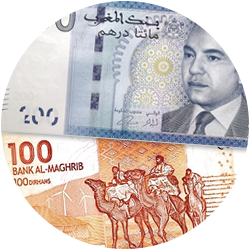Teaching English in Morocco
Everything you need to know about teaching in the land of the setting sun.
Located in the northwest tip of Africa, Morocco offers a blend of Middle Eastern, African and European cultures. In recent years, it has become one of the world’s top tourist destinations for its beautiful beaches, ancient cities, and fantastic landscapes. Because of this, English teachers are in high demand in Morocco.

Wages
Wages
Earn between 5,000-30,000 dirhams per month.
(That’s $500-$3,000 USD!)

Lifestyle
Lifestyle
While Morocco is rooted in a traditional, Islamic culture, in many cities, Moroccans have taken on a more modern, Mediterranean lifestyle with influence from nearby Europe and the West.

Communication
Communication
The official languages in Morocco are Modern Standard Arabic and Tamazight, but most Moroccans speak a Creole-type Arabic known as Darija. French is the most common second language spoken, and English speakers can often be found in tourist locations.

Climate
Climate
The climate in Morocco is considered moderate and subtropical. With multiple mountain ranges and the Sahara Desert to the west, the climate does vary throughout the country. In general, Morocco sees all four seasons, with moderately cold winters and very hot summers.
TEFL wages in Morocco
English teachers earn between 5,000-30,000 dirhams or more ($500-$3,000+ USD) a month in Morocco. The difference mainly depends on the type of school, the city, and your own experience/qualifications.
In general, here are the wages per month by school type:
| School type: | Wages: |
|---|---|
| Public schools | 10,000-18,000 dirhams ($1,000-$1,800) |
| Private schools | 10,000-20,000 dirhams ($1,200-$2,000) |
| Universities | 12,000-30,000+ dirhams ($1,200-$3,000+) |
| Language centers | 6,000-12,000 dirhams ($600-$1,200)* |
*Note that language centers typically include accommodation and healthcare for teachers.
Additionally, many teachers also supplement their wages with private tutoring – earning 50-200 dirhams per hour ($5-20 USD). Also, while language centers pay the least, they are the least strict when it comes to teaching requirements. Most schools require both a Bachelor’s degree and TEFL certificate, but a lot of language centers are willing to overlook the degree if you have a reputable TEFL certificate.
As for the cost of living, you can live quite comfortably on an average teaching wage in Morocco, especially in rural parts of the county. If accommodation isn’t provided by your school, you can often find one bedroom apartments for around 3,000-6,000 dirhams ($300-600 USD) a month, depending its location and condition.
Where to teach English in Morocco
People are drawn to Morocco for all sorts of reasons. Some come to enjoy the diverse food and shopping opportunities in Morocco’s bigger metropolitans. Some come for the natural appeal, and spend their time trekking through the mountains or driving through the desert. Others prefer to stick near the coast and enjoy the beaches; although be aware, as a Muslim country, you won’t see many women sunbathing in bikinis here.
Regardless of what draws one to Morocco, luckily, teaching jobs can be found throughout the country. This is mainly due to a recently implemented mass education reform by the Moroccan government.
Some of the most popular destinations are Marrakesh, Casablanca, Fez, and Rabat.
Marrakesh is a large city located inland, and is best known as one of Morocco’s four imperial cities. In the old part of the city known as the Medina, a UNESCO world heritage site, there is a palace, town square, mosque and tombs to visit. There are also thousands of souks, or stalls, selling a variety of foods, crafts, clothes, and goods in the streets and city squares.
Casablanca is the largest and most famous city in Morocco. A port city, Casablanca is located on the Atlantic coast and is known for its seaside resorts. Because of its geographical location, major port connections, and former French occupation, Casablanca has a lot of European influence. Its most famous landmark is the Hassan II Mosque, which is renowned as one of the largest and most elaborate mosques in the world.
Fez is an inland Moroccan city and is the second largest in the country. Most known as Morocco’s cultural city, Fez has a rich history and heritage. There are several festivals drawing thousands of visitors to Fez’s historic streets and medina all year-round.
Rabat is the capital of Morocco and is the seventh largest city. Located on the northern coast, Rabat is famous for its old medina, ancient city gates, and Islamic and Roman ruins. Rabat is also known for its nearby beaches and a free annual music festival called Mawazine.
Food in Morocco
Moroccan cuisine is colorful, spice-laden, and has a unique sweet-and-savory flavor. When teaching in Morocco you’ll discover all of the local favorites from each of Morocco’s ethnic backstories.
English teaching requirements in Morocco
To teach English in Morocco, you’ll most likely need to have both a bachelor’s degree and a TEFL certificate. However, it’s not necessary to be a native English speaker, so long as you have native-level fluency.
Note, while a work visa is required, it is possible to enter Morocco from most European and English-speaking countries, with the exception of South Africa, on a 90 day tourist visa. Schools, universities and language centers are willing to sponsor teachers for work visas, and the paperwork can be started after arriving in Morocco. However, beware that it can be a very long process. If it takes longer than 90 days, you would be required to leave Morocco and return in order to restart the 90 day clock. But don’t worry, with Spain just 8 miles to the north, it is a great excuse to plan a day trip on the ferry to the southern Spanish coast!
Non-natives: If you don’t have a passport from the UK/US/IRE/CAN/AUS/NZ/SA, you can still get a fully legal work permit in Morocco, however it would help to have a TOIEC/IELTS certificate.
Teachers without degrees: Public schools, private schools, and universities generally require a degree, but you might find language centers which will hire you and still arrange a work permit without a degree.

 Rated 97% on GoOverseas!
Rated 97% on GoOverseas!


